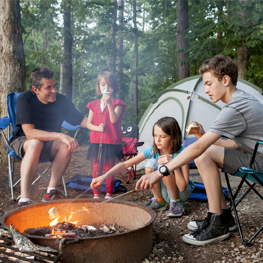
Is your child at risk for “Nature Deficit Disorder”? Richard Louv, author of Last Child in the Woods: Saving Our Children From Nature Deficit Disorder, coined this term which describes the growing social phenomenon of spending more time indoors with technology instead of outdoors in nature doing activities. Over the last couple of decades, it has become more challenging to stay connected to nature activities and enjoy healthy living in Calgary. Many in Calgary now choose to live in high-density housing like a condo townhouse or apartment. This may be an economical or a personal lifestyle choice. Whatever the reason, it makes it more difficult to find safe after school activities in Calgary with natural play spaces for children.
Recently, I met with Katie Jewitt and Paxton Bruce, research assistants from the Centre for Child Well-Being at Mount Royal University in Calgary. Our discussion echoed what I’d previously read in Louv’s book, Last Child, about the increased use of technology in children’s lives leading to a more sedentary indoor lifestyle and its effects on the ability to be creative, explorative, and motivated. We also discussed how research has revealed a secondary trend of many Calgary children becoming over- scheduled in structured activities, and how this, too, decreases time for child-initiated outdoor activities and play.
Calgary research has documented for the first time in many years that we may be faced with the possibility of our children having a shorter lifespan than us because of the sedentary indoor lifestyle resulting in the development of chronic disease at a much younger age. The 2015 ParticipACTION Report Card on Physical Activity for Children and Youth: The Biggest Risk is Keeping Kids Indoors is one of many reports documenting research on the health benefits of child-initiated outdoor play in nature.
Some examples of these health benefits are:
So what can we do to reconnect ourselves and our children to nature here in Calgary? Here are some suggestions to get you started:
Further suggestions for activities can be found in a wonderful book, I Love Dirt: 52 Activities to Help You and Your Kids Discover the Wonders of Nature by Jennifer Ward.
If we do not maintain this connection to nature, not only is our health affected, we risk losing our sensitivity to our surroundings and our compassion and respect for living things. This, in turn, affects our ability to care for the environment. Technology is here to stay, but we need to maintain control over it, instead of it controlling us. The welfare of our children and future generations may depend on it.
Susan is married, a mother of four young adult sons, and a former child care provider. Personal experiences have taught her that a balance between the use of technology and opportunities for creative, self-directed free play are essential for the healthy development of children.
Calgary’s Child Magazine © 2024 Calgary’s Child